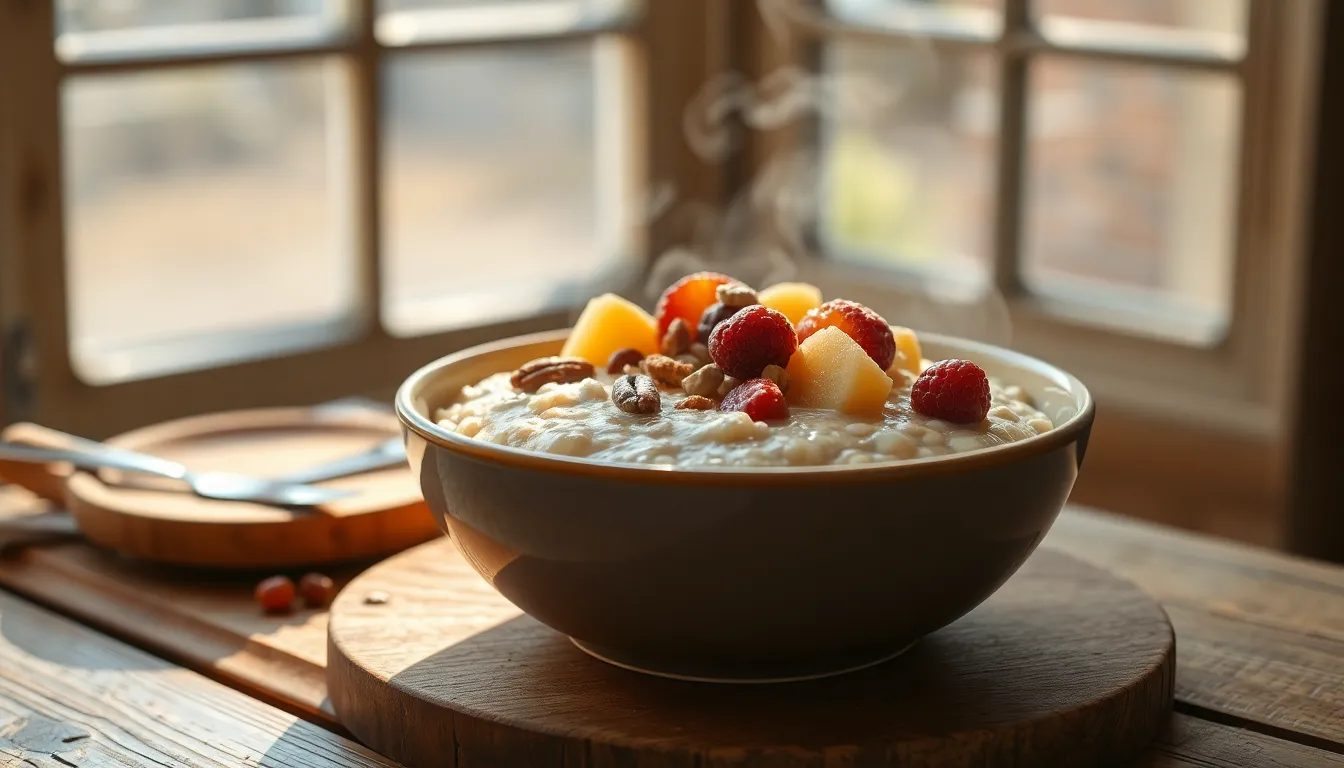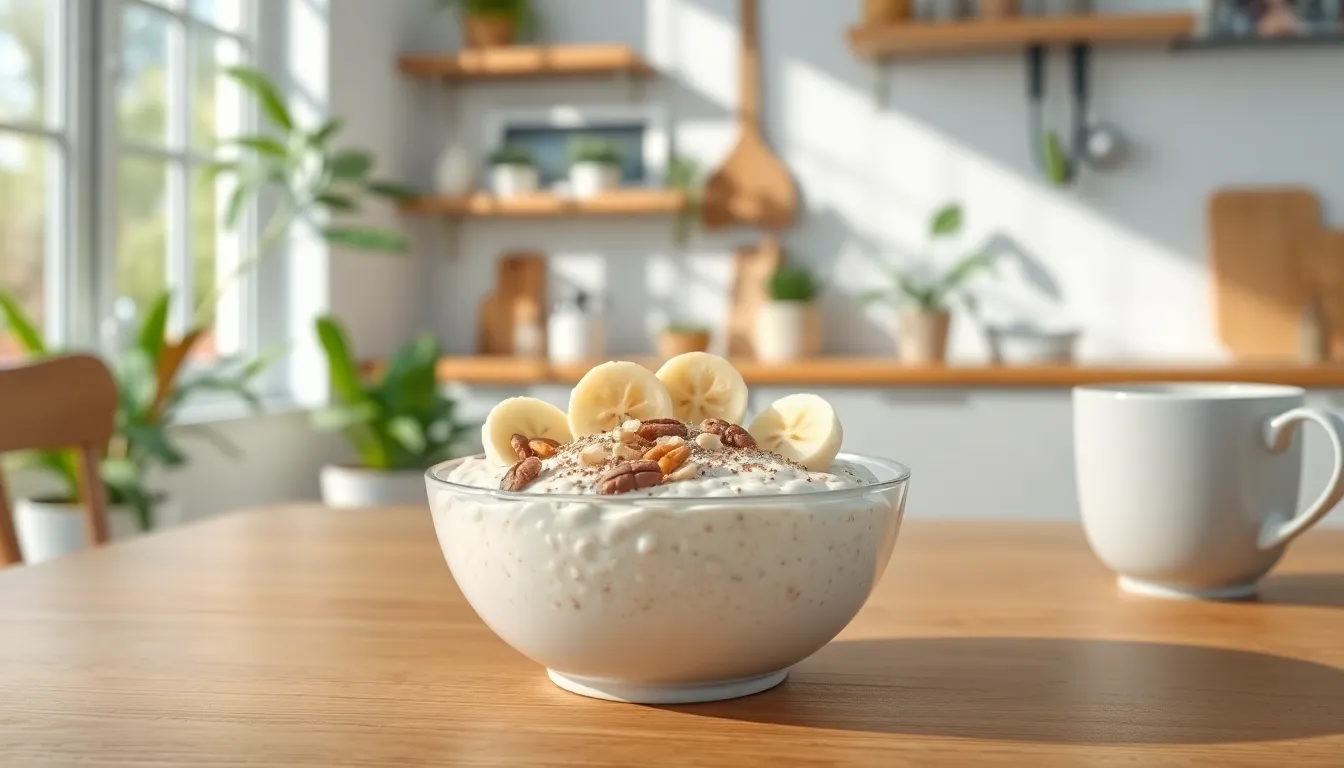Oatmeal often gets a bad rap as the boring breakfast choice, but it’s time to change that perception. Packed with nutrients, this humble grain is not just a cozy bowl of goodness; it’s also a protein powerhouse waiting to fuel your day. If you think oatmeal’s only claim to fame is its fiber content, think again.
Curious about how much protein’s hiding in that warm, creamy delight? You might be surprised. Whether you’re an athlete looking to bulk up or just someone trying to kickstart their morning with a healthy kick, oatmeal can be your secret weapon. Let’s dive into the protein-packed world of oatmeal and discover just how this breakfast staple can help you on your journey to health and happiness.
Table of Contents
ToggleUnderstanding Protein Requirements
Understanding protein needs is essential for optimizing health and nutrition. Oatmeal serves as a solid protein source, contributing to daily intake.
Daily Protein Needs
Daily protein needs vary by age, sex, and activity level. According to the Dietary Guidelines, adults require about 46 to 56 grams of protein daily. Athletes, on the other hand, often benefit from higher intakes, ranging from 1.2 to 2.0 grams per kilogram of body weight. Getting adequate protein supports muscle repair, enhances satiety, and contributes to overall health. Incorporating oatmeal into breakfast can help meet these protein needs effectively.
Factors Affecting Protein Intake
Several factors affect individual protein intake requirements. Body weight plays a crucial role; heavier individuals usually need more protein. Activity level significantly influences these needs as well; athletes demand higher amounts to fuel performance. Age also matters; older adults often require additional protein for maintaining muscle mass. Dietary preferences, such as vegetarian or vegan lifestyles, prompt adjustments in protein sources. Understanding these factors helps tailor protein intake specifically to individual needs.
Nutritional Profile of Oatmeal

Oatmeal offers a balanced mix of nutrients that supports health and wellness. This grain supplies energy while also providing essential proteins and other nutrients.
Macronutrients Overview
Oatmeal contains approximately 6 grams of protein per cooked cup, making it a solid protein source for breakfasts. Carbohydrates provide the primary energy, with about 27 grams in the same serving. Fiber, particularly soluble fiber, contributes significantly, with around 4 grams enhancing digestive health. Fats remain minimal, typically around 2.5 grams, mostly consisting of healthy unsaturated fats. This macronutrient balance supports sustained energy release and health benefits throughout the day.
Micronutrients in Oatmeal
Oatmeal also brims with vitamins and minerals. It delivers significant amounts of manganese, supplying over 50% of the daily recommended intake per 100 grams. Phosphorus, magnesium, and iron are present, each supporting various bodily functions. B vitamins, including thiamin and folate, enhance metabolism and energy production. Antioxidant compounds, like avenanthramides, offer additional health benefits. This combination of micronutrients further promotes overall health, making oatmeal a nutritious choice.
How Much Protein in Oatmeal?
Oatmeal provides a noteworthy source of protein, making it an attractive breakfast choice. Nutrition experts recognize its vital role in daily diets.
Protein Content per Serving
Each cooked cup of oatmeal contains approximately 6 grams of protein. This amount contributes significantly to daily protein intake goals. Athletes and health-conscious individuals often use oatmeal as a fundamental food for muscle recovery and energy replenishment. With its balanced composition of macronutrients, oatmeal supports fullness and satisfaction. Incorporating oatmeal into breakfast routines can help people easily meet their protein requirements.
Comparisons with Other Grains
Compared to other grains, oatmeal stands out for its protein content. For example, quinoa delivers about 8 grams of protein per cooked cup, while brown rice offers only around 5 grams. Wheat, a common grain, typically provides 5 to 6 grams of protein per serving as well. Considering these comparisons, oatmeal remains a competitive option for those seeking plant-based protein sources. Its unique nutritional profile also offers added health benefits, reinforcing oatmeal as a worthy breakfast staple.
Benefits of Protein in Oatmeal
Incorporating protein from oatmeal offers multiple health advantages. Increased protein intake supports physical fitness and overall well-being.
Muscle Growth and Repair
Oatmeal plays a role in muscle growth and repair. With approximately 6 grams of protein per cooked cup, it aids in rebuilding muscle tissue after exercise. During recovery, protein is essential for repairing micro-tears caused by physical activity. By including oatmeal in a post-workout meal, individuals enhance protein synthesis, crucial for muscle recovery. Plant-based proteins found in oatmeal contribute to a balanced diet, especially for those seeking non-animal protein sources. Regular consumption can support muscle strength and improve workout recovery time.
Satiety and Weight Management
Oatmeal contributes to satiety and effective weight management. Its protein content, along with high fiber levels, promotes feelings of fullness. Consuming oatmeal can reduce hunger, potentially leading to lower overall calorie intake throughout the day. Less frequent snacking may help individuals maintain a healthy weight. Additionally, the slow-digesting carbohydrates in oatmeal provide sustained energy, preventing spikes in blood sugar. Opting for oatmeal as a breakfast choice equips individuals with the nutrients needed to stay energized and satisfied, fostering better dietary habits.
Ways to Increase Protein in Oatmeal
Increasing protein in oatmeal can transform it into an even more nutritious breakfast. Several methods exist to boost its protein content without compromising flavor or texture.
Add-Ins for Enhanced Protein
Protein powder serves as a straightforward option. Adding a scoop of your favorite protein powder can quickly increase oatmeal’s protein content by 15 to 30 grams. Greek yogurt acts as another fantastic add-in, providing around 10 grams of protein per serving. Nut butters like almond or peanut butter can enrich oatmeal with 4 to 8 grams of protein while adding healthy fats. Chia seeds contribute about 3 grams of protein for every two tablespoons, enhancing both protein and fiber content. Topping oatmeal with nuts such as walnuts or almonds can yield an additional 5 to 8 grams of protein, making the dish more satisfying.
Preparing High-Protein Oatmeal Recipes
Combining oatmeal with eggs offers a remarkable protein boost. Mixing in a beaten egg during cooking can add around 6 grams of protein. Overnight oats can incorporate milk instead of water, enhancing protein content when using dairy or plant-based milk. Incorporating cottage cheese into oatmeal before serving can yield an impressive 14 grams of protein. Preparing oatmeal with quinoa instead of water allows for an extra 8 grams of protein. Looking for easy recipes? Consider protein-packed oatmeal bowls that blend several protein sources for a well-balanced meal.
Oatmeal stands out as a versatile and nutritious breakfast option. Its protein content combined with fiber makes it a powerful choice for anyone aiming to boost their morning meals. With approximately 6 grams of protein per cooked cup oatmeal not only supports muscle repair but also aids in weight management and satiety.
Tailoring oatmeal with protein-rich add-ins can elevate its nutritional profile even further. By understanding personal protein needs and incorporating oatmeal into a daily routine individuals can enjoy a fulfilling breakfast that contributes to overall health. Embracing oatmeal as a staple can lead to improved energy levels and enhanced well-being.








